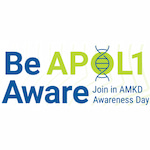AMKD Awareness Day Date in the current year: April 28, 2026
 AMKD Awareness Day is observed annually on the last Tuesday in April. It was established by the American Kidney Fund to raise awareness of APOL1-mediated kidney disease.
AMKD Awareness Day is observed annually on the last Tuesday in April. It was established by the American Kidney Fund to raise awareness of APOL1-mediated kidney disease.Kidney disease (renal disease, nephropathy) is an umbrella term for damage to or disease of the kidney that can be caused by a variety of factors, including long-term usa of certain medications, diabetes, genetic factors, COVID-19, an unbalanced diet, autoimmune disorders, exposure to toxic chemicals, and some others.
APOL1-mediated kidney disease (AMKD) is caused by changes (mutations) in the apolipoprotein L1 (APOL1) gene. APOL1 is a protein that helps transport lipids through the bloodstream and protect the body against certain parasites, such as trypanosomes carried by tsetse flies that cause African sleeping sickness.
Some mutations in the APOL1 gene provide better protection against trypanosomes but may also increase the risk of kidney disease. These mutations are common in people who were born in or have an ancestor who came from West or Central Africa. An estimated 13% of Black Americans in the United States have mutations in both alleles (copies) of the APOL1 gene. Afro-Caribbean and Latinx populations whose genetic influences include African ancestry may also have such mutations.
It is important to note that not all people who have two copies of a risk variant of the APOL1 gene will develop AMKD; their chance of developing kidney disease in their lifetime is about 20%. In other words, 1 in 5 people with two copies of an APOL1 risk variant will develop AMKD.
APOL1 mutations can damage parts of the kidney responsible for filtering blood and sometimes cause kidney cells to die, leading to damage, scarring, and an increased risk of kidney failure. AMKD can be asymptomatic until the kidneys are close to failing. Early symptoms may include high blood pressure, weight gain or swollen legs, weakness and fatigue, and protein in the urine.
There is no specific treatment for AMKD that is different from the standard treatment for chronic kidney disease. Treatment focuses on managing the symptoms, controlling the progression of the disease, and treating any co-morbid conditions. It includes lifestyle changes (eating a balanced diet, exercising, quitting bad habits, limiting salt and alcohol intake, maintaining a healthy weight), medications to control high blood pressure and cholesterol levels, diuretics to prevent swelling caused by water retention, etc. Patients with kidney failure will require dialysis or a kidney transplant.
AMKD Awareness Day was created by the American Kidney Fund (AKF), a nonprofit organization focused on kidney health awareness, education and prevention, as well as providing financial assistance for low-income dialysis patients. Its main goals are to educate the general public about AMKD and to encourage people of West and Central African descent to get their kidneys checked and to consider genetic testing to learn if they have an APOL1 mutation, especially if there is a family history of kidney disease.
- Category
- International Observances
- Tags
- AMKD Awareness Day, APOL1-mediated kidney disease, international observances, awareness days, genetic conditions